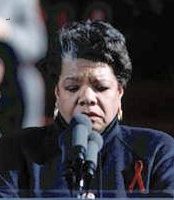Black History, Music, The Arts
 “Lift Every Voice and Sing” — sometimes referred to as “The Negro National Hymn” or ” The Black National Anthem”— is a song written as a poem by James Weldon Johnson (1871 – 1938) in 1899 and set to music by his brother John Rosamond Johnson (1873 – 1954) in 1900.
“Lift Every Voice and Sing” — sometimes referred to as “The Negro National Hymn” or ” The Black National Anthem”— is a song written as a poem by James Weldon Johnson (1871 – 1938) in 1899 and set to music by his brother John Rosamond Johnson (1873 – 1954) in 1900.
“Lift Every Voice and Sing” was publicly performed first as a poem as part of a celebration of Lincoln’s Birthday on February 12, 1900, by 500 school children at the segregated Stanton School. Its principal, James Weldon Johnson, wrote the words to introduce its honored guest Booker T. Washington. The poem was later set to music by Johnson’s brother John in 1905.
In 1939, Augusta Savage received a commission from the World’s Fair and created a 16-foot plaster sculpture called Lift Ev’ry Voice and Sing which was destroyed by bulldozers at the close of the fair. (more…)
Black History, Military

Dorie Miller
Doris Miller, known as “Dorie” to shipmates and friends, was born in Waco, Texas, on 12 October 1919, to Henrietta and Conery Miller. He had three brothers, one of which served in the Army during World War II. While attending Moore High School in Waco, he was a fullback on the football team.
He worked on his father’s farm before enlisting in the U.S Navy as Mess Attendant, Third Class, at Dallas, Texas, on 16 September 1939, to travel, and earn money for his family. He later was commended by the Secretary of the Navy, was advanced to Mess Attendant, Second Class and First Class, and subsequently was promoted to Ship’s Cook, Third Class.
Following training at the Naval Training Station, Norfolk, Virginia, Miller was assigned to the ammunition ship USS Pyro (AE-1) where he served as a Mess Attendant, and on 2 January 1940 was transferred to USS West Virginia (BB-48), where he became the ship’s heavyweight boxing champion. In July of that year he had temporary duty aboard USS Nevada (BB-36) at Secondary Battery Gunnery School. (more…)
Artists, Black History, The Arts

Geraldine McCullough
Renowned sculptor and painter Geraldine McCollough was born Geraldine Hamilton on December 1, 1917 in Kingston, Arkansas, and raised in Chicago from the time she was three years old. McCullough attended the Art Institute of Chicago for undergraduate and graduate studies, receiving her B.A. degree in 1948 and her M.A. degree in art education in 1955. As a student, she earned a John D. Standecker Scholarship, a Memorial Scholarship and a Figure Painting Citation.
After completing her graduate studies, McCullough taught art at Wendell Phillips High School in Chicago. She also began exhibiting her paintings at various national galleries, receiving first prize in 1961 at the Art Exhibit of Atlanta University. (more…)
Black History, The Arts

Maya Angelou a.k.a. Marguerite Johnson
Original name MARGUERITE JOHNSON (b. April 4, 1928, St. Louis, Mo., U.S. – d. May 28, 2014, Winston-Salem N.N.).
Maya Angelou was a black American poet whose several volumes of autobiography explore the themes of economic, racial, and sexual oppression.
Although born in St. Louis, Angelou spent much of her childhood in the care of her maternal grandmother in rural Stamps, Ark. Raped at the age of eight by her mother’s boyfriend, she went through an extended period of muteness. This early life is the focus of Angelou’s first autobiographical work, I Know Why the Caged Bird Sings (1970). Subsequent volumes of autobiography include Gather Together in My Name (1974), Singin’ and Swingin’ and Gettin’ Merry Like Christmas (1976), The Heart of a Woman (1981), and All God’s Children Need Traveling Shoes (1986). (more…)
Black History, Firsts, Medicine

Rebecca Lee Crumpler
Rebecca Lee Crumpler challenged the prejudice that prevented African Americans from pursuing careers in medicine to became the first African American woman in the United States to earn an M.D. degree, a distinction formerly credited to Rebecca Cole. Although little has survived to tell the story of Crumpler’s life, she has secured her place in the historical record with her book of medical advice for women and children, published in 1883.
Crumpler was born in 1831 in Delaware, to Absolum Davis and Matilda Webber. An aunt in Pennsylvania, who spent much of her time caring for sick neighbors and may have influenced her career choice, raised her. By 1852 she had moved to Charlestown, Massachusetts, where she worked as a nurse for the next eight years (because the first formal school for nursing only opened in 1873, she was able to perform such work without any formal training).
In 1860, she was admitted to the New England Female Medical College. When she graduated in 1864, Crumpler was the first African American woman in the United States to earn an M.D. degree, and the only African American woman to graduate from the New England Female Medical College, which closed in 1873. (more…)
 “Lift Every Voice and Sing” — sometimes referred to as “The Negro National Hymn” or ” The Black National Anthem”— is a song written as a poem by James Weldon Johnson (1871 – 1938) in 1899 and set to music by his brother John Rosamond Johnson (1873 – 1954) in 1900.
“Lift Every Voice and Sing” — sometimes referred to as “The Negro National Hymn” or ” The Black National Anthem”— is a song written as a poem by James Weldon Johnson (1871 – 1938) in 1899 and set to music by his brother John Rosamond Johnson (1873 – 1954) in 1900.


